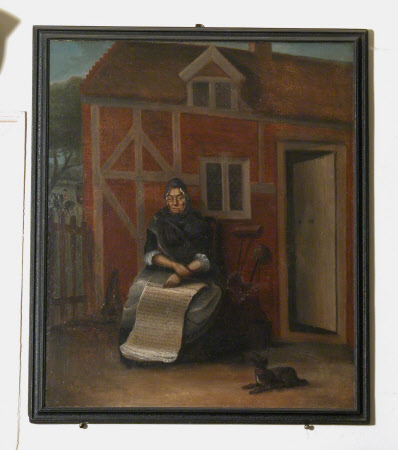Mrs Jane Ebrell (b. 1706), former Housemaid and 'Spider-brusher', aged 87
Category
Art / Oil paintings
Date
1793
Materials
Oil on canvas
Measurements
1143 x 914 mm (45 x 36 in)
Order this imageCollection
Erddig, Wrexham
NT 1151282
Caption
Of the many fascinating and vibrant servants' portraits hung at Erddig, this image of Mrs Jane Ebrell, described as 'Spider Catcher, aged 87' perhaps typifies them all. Ebrell may be portrayed (literally) 'warts and all', but that she is portrayed at all is a demonstration of the esteem in which she was held by the Yorke family, owners of Erddig. For generations after this image, Erddig's servants were memorialised with their own painting (then later photograph), typically situated by their lodgings or workspace, or holding a tool of their trade. The contemporary Yorke would then accompany the image with a short poem about the servant. Ebrell is seen here in front of her lodgings, with broom and mop at her side and holding her poem, which can be read, within the painting.
Summary
Oil painting on canvas, Mrs Jane Ebbrell (b. 1706), former Housemaid and 'Spider-brusher' by John Walters of Denbigh (Welsh, fl. 1791-6), 1793, inscribed fully on scroll. Aged 87, she is seated, full-length, outside her cottage, a broom and mop beside her holding a scroll on her lap. She was the wife of the coachman to Simon Yorke I and her son was the coachman to Philip Yorke I. A footnote to the published version of the poem reveals that she was once housemaid and spider-brusher (? laundress A.L.Cust) to 'Master Meller' (d.1733).
Provenance
Commissioned by Philip Yorke I (1743 - 1804) and thence by descent;given by Philip Yorke III (1905 – 1978) along with the estate, house and contents to the National Trust in 1973
Credit line
Erddig, The Yorke Collection (National Trust)
Marks and inscriptions
Recto: [With 18 lines of verse on a scroll held on her lap:] To dignifie our Servants' Hall / Here comes the Mother, of us all; / For seventy years, or near have passed her, / Since spider-brusher, to the Master, a / When busied then, from room to room, / She drove the dust, with brush and broom / And by the Virtues of her mop / To all uncleanness, put a Stop / But changing her house maiden state, / She took our Coachman, for a mate, / To whom she prov'd an useful gip, b / And brought us forth a second whip, / Moreover, this, oft, when she spoke, / Her tongue, was midwife, to a joke; / And making many an happy hit, / Stands here recorded for a Wit: / O may she, yet some years, survive, / And breed her Grandchildren to drive. [Below verse:] a. Master Meller died in 1735 in whose service she / (was housemaid / b. A Cambridge term for a […] who waits on the college.) / c. The Son was coach man to Mr. Philip Yorke, the father to / old Mr. Simon Yorke of Erthig.) Jane Ebbrell, AEt 87 1793
References
Yorke, 1802: Crude-ditties by PhilipYorke, 1802 Erddig 1914 Chronicles of Erthig on the Dyke by Albina Lucy Cust, (2 vols) 1914 , vol. II, pp. 186-87 Steegman 1957 John Steegman, A Survey of Portraits in Welsh Houses, Vol.I: North Wales, Cardiff, 1957, pp.97-98 Waterson, 1980: Merlin Waterson, The Servants' Hall. A Domestic History of Erddig, Routledge & Kegan 1980, pp. 24-25 & fig.20 Erddig, Clwyd: 1995 [The National Trust] 1995, p.41. illus p.19

